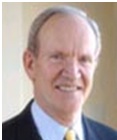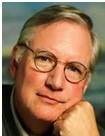|
 |
|
 |
|
|
||
Robert (Bob) Waterman
American management expert (pictured right) who shot to worldwide fame as co-author of In Search of Excellence (see below).
Key books
In Search of Excellence (1982), written with Thomas Peters (pictured right below) (see for more detail
In Search of Excellence in the Business Books section)
Excellent companies have eight characteristics:
1. Hands-on value driven Following customer-driven values and beliefs.
2. Close to the customer An obsession with excellent service, quality and reliability.
3. A bias for action - a ‘can do’ mentality heavily dependent on informal contacts.
4. Autonomy and entrepreneurship The encouragement of innovation through:
5. Productivity through people Maximizing people’s potential through:
6. Sticking to the knitting Sticking “reasonably close” to the business(es) you know best.
7. Simple form, lean staff Simple organization structure minimizing layers of management and staff at head office.
8. Simultaneous loose-tight properties A combination of:
Peters and Waterman wrote the book as employees of the American management consultants, McKinsey, and used its 7-S Framework to analyse an organization’s success:
Key quotes on customers Customers reign supreme.
Key quotes on business success The excellent companies were, above all, brilliant at the basics. They give people pride in what they do. They make it possible to love the product (talking about excellent companies).
Key quotes on people management Treat people as adults. Treat them as partners; treat them with dignity; treat them with respect.
The Renewal Factor (1987)
The best organizations continually renew themselves by:
1. Motivating and empowering their employees - through:
2. Change Changing to adapt to changes in customer needs, but there must also be “a constant interplay between stability and change”.
3. Informed opportunism Exploiting market opportunities through:
Key quotes on change and business success No organization can strive for excellence, or even attempt to improve, without the ability to renew. The only true source of renewal in a company is the individual.
The Frontiers of Excellence (1994) - What America Does Right (in America)
The best companies satisfy their employees and customers better than their competitors do through:
1. Continuous innovation (from self-managing small business units and teams).
2. Quality improvements
3. Visionary, ethical and visible leadership Put people first and see profits pile up.
4. Low costs and long-term planning
5. Lifelong learning and challenging aims
6. Motivating and empowering employees
Empowerment is particularly important and requires satisfying an employee’s needs via:
Happy employees mean happy customers and higher profits.
Key quote on leadership Today’s leaders understand that you have to give up control to get results
Key quote on human resource management Exciting results attract top people... and top people produce exciting results.
Key quote on motivation People... need to feel that their organization stands for something important. . |
|
|
||
|
|
||
| Copyright © wisdomtowin.com 2025 All Rights Reserved | ||
|




